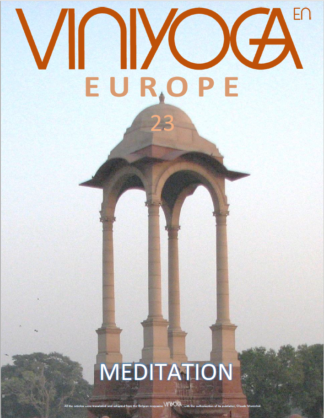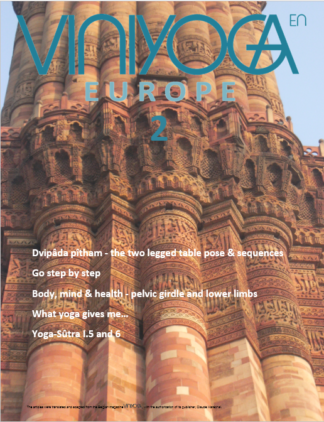Description
(36 pages)
ÛRDHVA PRASRITA PÂDÂSANA
Ûrdhva prasrita pâdâsana has a prime place in the group of “lying on the back” poses. Its adaptations and variations allow it to be a pose for beginners and for more trained practitioners, as well.
By Claude Maréchal
SEQUENCE
In this sequence, we have a short and simple static application of the classical posture ûrdhva prasrita pâdâsana and we suggest a gradual progression in the duration of the static phase. This sequence starts and ends with samasthiti – the standing pose -, which serves as a reference.
By Claude Maréchal
THE SEQUENCE OF ÂSANA (5)
A sequence of âsana takes on a particular character as a result of the poses of the same type, which it contains.
In this article, we will see the construction and function of “inverted” and “seated” sequences.
By Claude Maréchal
THERE IS NOT A COMMON RECIPE FOR EVERYONE
By T.K.V. Desikachar
THE BHAGAVAD-GÎTÂ (2)
In the first article published in the previous issue, Richard Belfer presented us with the first six chapters of the Bhagavad-Gîtâ, showing the importance given to action and karma yoga.
This second article devoted to the twelve following chapters explains how concepts such as bhakti, the play of the guna, etc. are presented. The skill and consistency of Krishna’s pedagogy in his teaching remains one of the important aspects of the Gîtâ.
By Richard Belfer
DHARMA AND ADHARMA
ORDER AND DISORDER ACCORDING TO INDIAN THOUGHT
The human being has always been confronted with disorder – interior and exterior – and he has often looked for order through sometimes questionable means.
By François Laurin
FIRST STEPS
How yoga changed my life…
By Jean Hoyberghs
YOGA-SÛTRA I.23
Aphorism I.23 leads us to explore a new domain in Yoga-Sûtra: The one, which presents the choice of means in order to realize the state of yoga. The first means – devotion – is also the most relevant. So we are giving it special attention.
Comments by Professor T. Krishnamacharya; Presentation and Explanations by T.K.V. Desikachar





